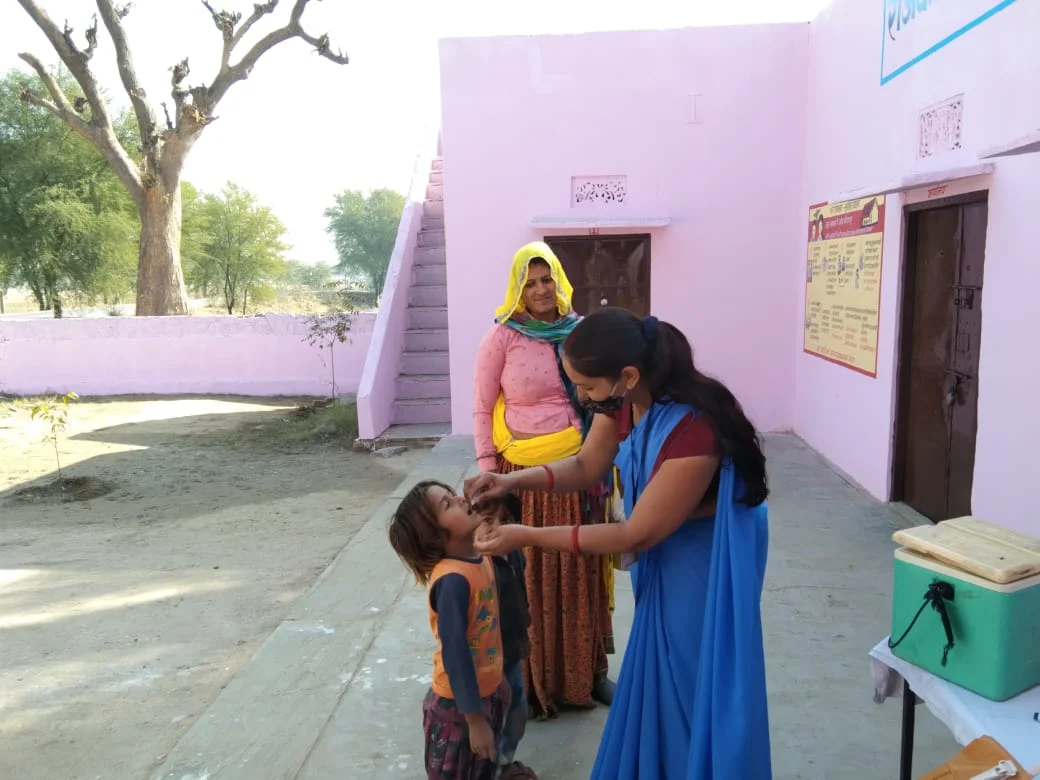By Praduman Choubey
For almost two years now, Chaya Kumari’s husband Jitendra has relied on daily wage work which is scarce in their village, Patia, situated in the Jamadoba area in Jharkhand’s Dhanbad district. He returned at the beginning of the lockdown last year, after completing his apprenticeship with a private company, but is now mostly idle at home.
Kumari, however, continues to support her family. Considered one of the most educated women in her village, she is currently pursuing an M.A in English. The 24-year-old is also quite entrepreneurial, much like the other 11 members of the Maa Durga Mahila Samiti (Mother Durga Women’s Committee), a women’s Self Help Group (SHG) in Patia. Together, in December 2020, they forayed into mushroom cultivation to generate income and tackle post-pandemic financial challenges.
“We constituted our group about 15 years ago and got into black-soap making in 2015. (Black soap is a raw detergent cake made with caustic soda that is used to wash clothes and is much cheaper when compared to other detergent soaps in the market.) A unit was established in the village’s community centre by Tata Steel Foundation,” said Pyasi Devi (45), the group leader of Maa Durga Mahila Samiti.
While the Samiti’s soap-making venture carried on successfully for about five years, it was discontinued due to decreased demand and the lack of a proper marketing strategy. With the onslaught of the pandemic, the group turned towards something more lucrative.
“Mushroom cultivation is much more profitable when compared to soap making. Moreover, the product can easily be sold in the local market at Jamadoba itself through vegetable retailers,” Kumari told 101Reporters. There have been some taboos surrounding ‘working women’ in the region, but Kumari feels there is no harm in helping out the family. “In fact, it was the women of our mother-in-laws’ generation who had started the initiative to support the family. They later allowed us to be part of their group and help them work,” she added.
Maa Durga Mahila Samiti is currently in its second round of cultivation. For the current season, the SHG has invested Rs 1,500 for 3 kg raw material, which will yield 120 kg of mushroom. This will be sold for Rs 400 per kg. Thus, the total anticipated sale of Rs 48,000 is 32 times the initial investment.
“This year, the monthly income through the project is around Rs 2,000. We invested cautiously because during our first attempt, the crop was ruined due to lack of proper care and experience,” said Sarla Devi. Her 28-year-old daughter-in-law Kavita Devi told 101Reporters that “the plant grows in darkness and also requires controlled slightly-moderate temperatures. The only requirement in mushroom cultivation is patience.”
Kavita’s husband, Anand Kumar, owns a grocery shop in the village but couldn’t earn enough to provide good education to his two children. The women in the family are hoping to change that.
“We are also engaged in making special diyas (small oil lamps) made using multani mitti (a type of clay soil), straw and cow dung. These diyas are more durable, eco-friendly and less fragile as compared to earthen diyas,” said Sarla Devi.
Adapting to change
Maa Durga Mahila Samiti is not the only thriving SHG in the region. The women of Sirguja Basti, a village less than two kilometres from Patia are also organised under the Pragya Mahila Swayam Sahaya Samuh (Pragya Women’s Self Help Group). The 13-member SHG is involved in fish farming and has had similar success as their counterparts in the neighbouring village. This SHG too has managed to adapt their strategies to a changing market.
Led by 50-year-old Savitri Devi, the SHG was earlier in the craft of making candles. However, the demand for the candles decreased with the complete electrification of the village and the popularisation of inverters during power cuts. So Pragya Mahila Swayam Sahaya Samuh experimented with several products like making snacks and paper bags before finally settling on fish farming about two years ago.

The most significant benefit of the fish farming project is that it is easy to market and sell. “Local agents come to the village to buy fish from us at Rs 120/kg,” SHG member Lalita Devi told 101Reporters. She added, “As a traditional practice, the villagers engaged in fish farming in a small village pond; but in 2017 Tata Steel Foundation expanded the pond size and constructed ghats around it, helping and training us to carry out fish farming in an organised manner.”
In both these instances, the involvement of a civil society organisation (in this case a CSR wing) has helped them innovate and pivot into lucrative ventures where many other SHGs have floundered, without support, in the face of changing market dynamics. A women SHG established with the support of Dhanbad Municipal Corporation three years ago at Bapu Nagar area of Dhanbad, which was engaged in the manufacture of lac bangles, has been lying defunct for close to 18 months due to the lack of marketing support for their product.

The presence of Tata Steel in the region precedes Indian independence and they are heavily involved in community development activities. Tata Steel’s mining operations in Jharia began in 1910 with Bhelatand colliery and subsequently other collieries like Malkera, Sijua, Jamadoba etc. Currently, Tata Steel has around 2,000 employees in its Jharia division and has approximately 40 leasehold villages.
The foundation has been supporting the activities of several SHGs, including the Maa Durga Mahila Samiti. Aside from providing them with the necessary training, they have also provided the SHG with a dark room to grow mushrooms alongside raw material such as dry substrate—a mixture of plant wastes.
Strengthening financial literacy and independence
These self-help groups have inculcated financial independence alongside necessary business literacy amongst women in these villages. Kavita’s Devi’s children are enrolled in a private school and she was finding it difficult to manage their fees with the limited income from her husband’s grocery shop. But now there is less strain on their finances due to the money she earns through the SHG.
“The formation of a self-help group in the village has enabled better coordination among women. They can visit any place together to learn about the advantages of various government welfare schemes meant for them,” said Chandana Devi, a member of Pragya Mahila Swayam Sahayata Samuh. She also feels that the SHG initiatives have not only financially strengthened them but also improved their standing in the family. Instead of being ignored, their views are now considered with due weightage.
Savitri Devi echoed her sentiments. She said, “Earlier objections were raised when we stepped out of the house or talked to a male member outside the family. However, through the work of the SHG, we started contributing towards family income and worked for the upliftment of the family in various ways. For instance, we provided better education to our children. Hence, our say in family matters has greatly increased, and the villagers’ perception towards women is changing positively.”
Praduman Choubey is a Dhanbad based freelancer who has worked with prominent mainline english dailies including, The Telegraph, The Times of India and Hindustan Times for over 16 years. He has worked extensively on Jharia fire and subsidence, art and culture, education, crime, human interest etc.
This story was published by 101 Reporters and has been re-published here with consent.
About the author(s)
101Reporters is a pan-India network of grassroots reporters that brings out unheard stories from the hinterland.





